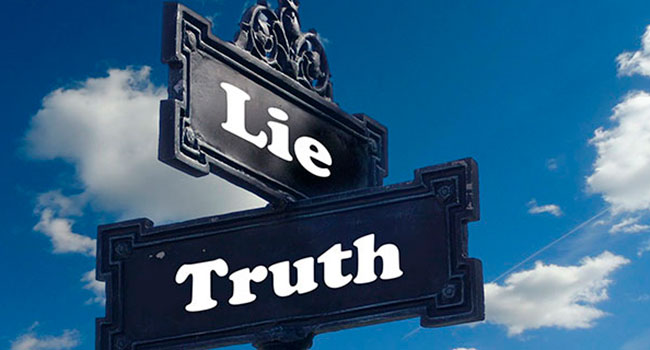 Then you will know the truth, and the truth will set you free. (John 8:32)
Then you will know the truth, and the truth will set you free. (John 8:32)
There was a time in our society when this important biblical passage meant something. Honesty was the best policy. Always follow the straight and narrow path in life. Young George Washington couldn’t lie to his father about chopping down a cherry tree (although that was nothing more than a myth).
Sadly, this is no longer the case.
The majority of people remain good, honest and decent. But a not-so-insignificant minority will deny, ignore, twist or even lie about the truth. The repercussions are meaningless to them and they care not a whit about the ill effect it has on our democratic institutions.
Take the controversy between former Liberal cabinet minister Jody Wilson-Raybould and the prime minister’s office with respect to the SNC-Lavalin controversy.
It’s alleged the PMO tried to influence or pressure Wilson-Raybould to intervene in a criminal proceeding involving the Montreal-based engineering/construction company.
Prime Minister Justin Trudeau and the PMO have denied pressuring her, although they’ve apologized for not defending her in public.
Wilson-Raybould, a former Justice minister, attorney general of Canada and Veterans Affairs minister, has maintained radio silence for most of the past two weeks due to attorney-client privilege.
The notable exception was her Feb. 20 statement in the House of Commons. “I understand fully that Canadians want to know the truth and want transparency,” she said. “Privilege and confidentiality are not mine to waive, and I hope that I have the opportunity to speak my truth.”
The standing ovation Wilson-Raybould received from opposition parties in Parliament, juxtaposed with the silent, stone-faced looks from her Liberal colleagues, was a powerful and stunning image few Canadians will forget.
One of them is telling the truth (more or less) and the other is lying. Which is which?
I thought former lawyer Bryan Dale crafted it nicely in a Feb. 21 tweet: “I still don’t trust anyone who speaks of ‘my truth’. I don’t want her truth, I want the truth.” His second line is exactly what most Canadians want, need and/or expect to happen.
But will it come to fruition?
The Liberal government has been skating around this controversy to the point where giant figure eights on the ice could be easily seen in space. For instance, they denied the original Globe and Mail bombshell report about SNC-Lavalin, but that’s no longer a strong defence in light of what’s come out.
Trudeau initially claimed he didn’t directly influence Wilson-Raybould to intervene but wouldn’t immediately tackle the allegation of the PMO pressuring her.
Conversations about SNC-Lavalin have changed from almost nothing to an admission of spirited debate. Party unity has been demanded, but some Liberal MPs have clearly broken ranks and defended their colleague.
Since the Liberal version of the truth is so badly tainted in the eyes of many Canadians of different political stripes, Wilson-Raybould’s version of the truth will become the default position. No matter what she says or does from this point.
Does that mean we can trust her truth?
It depends on your perspective.
If you believe that one party or individual has to be right and the other has to be wrong, her impending testimony at the House of Commons justice committee seems stronger.
If you’re content with most of the truth coming out of the SNC-Lavalin controversy, she still comes out ahead because she seems more honest and ethical.
If you don’t trust anything politicians or parties say, no one comes out ahead. But her version doesn’t lose any credibility with less cynical individuals.
Wilson-Raybould, therefore, has an enormous political advantage over Trudeau and the PMO. She controls the political narrative, can bide her time and get her thoughts together.
That may just mean the truth will set her free.
Troy Media columnist and political commentator Michael Taube was a speechwriter for former Prime Minister Stephen Harper.
The views, opinions and positions expressed by columnists and contributors are the author’s alone. They do not inherently or expressly reflect the views, opinions and/or positions of our publication.


